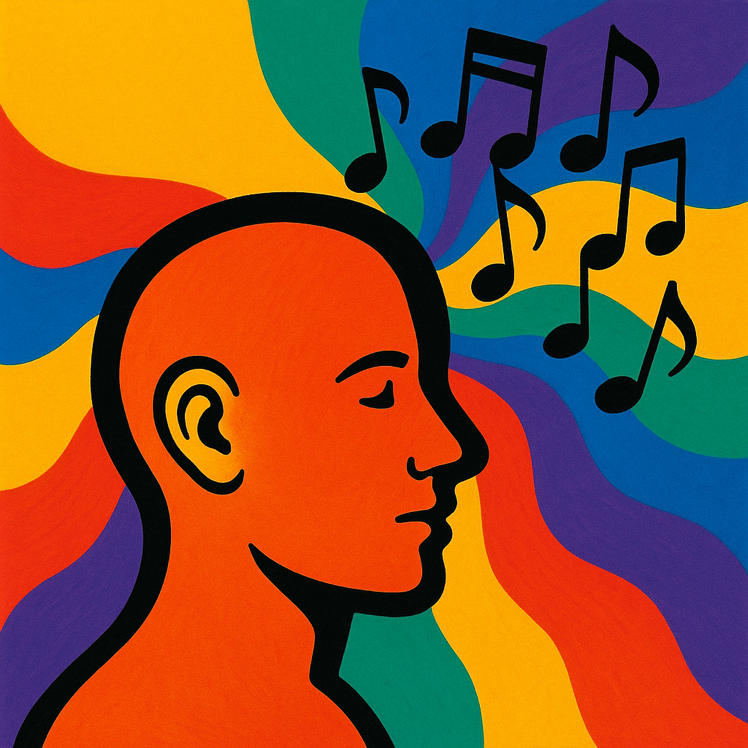For decades, music teachers have told students that absolute pitch is a mysterious talent bestowed upon infants and prodigies. Supposedly, if you didn't start Suzuki violin before kindergarten you'll never be able to identify a B♭ without playing another note first. Science has changed that story. A growing body of research shows that adults can develop the pitch memory and naming ability known as perfect pitch, and that many people already possess a hidden form of it without even realizing.

What Perfect Pitch Means
Perfect pitch, also called absolute pitch, is the ability to name or reproduce a musical note without any reference. It's like recognizing colors: once you know what "red" looks like, you don't need to compare it with "green" to identify it. Relative pitch, by contrast, is the ability to recognize the interval between two notes. Both skills are useful, but absolute pitch gives you an internal map of pitch classes, allowing you to label notes like C♯ or F♮ on the spot.
Evidence From Adult Training
In early 2025 a University of Surrey team ran an eight‑week online program designed specifically for adults. Participants learned to identify seven pitch classes on average with 90% accuracy, and two of the twelve musicians mastered all twelve notes. The program focused on pitch class recognition rather than specific frequencies and minimized reliance on relative cues.
Another line of evidence comes from the world of earworms. In a 2024 study at UC Santa Cruz, participants were prompted at random times to record songs stuck in their heads. Remarkably, 44.7% of the recordings matched the original songs with zero pitch error, and 68.9% were within a semitone. These individuals were not professional musicians; they simply reproduced pitches accurately without any external cue. The researchers concluded that a "hidden perfect pitch" ability is much more common than previously thought.
A third study, published in 2025 in the journal Music Perception, takes a broader look at why absolute pitch is rare and whether it can be learned. Psychologist James Schmidt argues that rarity may be due as much to training as to genes. The review article on implicit and explicit absolute pitch notes that most people possess an implicit form of absolute pitch, the ability to identify notes unconsciously without being able to label them, and highlights evidence that incidental learning methods can help adults acquire explicit absolute pitch.
These studies together suggest that accurate pitch memory is common and that with focused training adults can learn to label what they already hear.
Why Adult Learning Is Possible
Neuroscience has shown that long‑term musical training changes the structure and function of the brain. Musicians exhibit enhanced connectivity in their auditory cortex and thicker corpus callosums relative to non‑musicians. This adaptability, known as neuroplasticity, does not shut off after childhood. When you repeatedly practice identifying notes, you strengthen the neural circuits involved and weaken competing circuits. Focused attention and repetition are key to rewiring your auditory pathways.
How to Train Your Ears
- Isolate pitch classes: Work on recognizing the inherent quality of each note rather than its relationship to others. This was the strategy used in the University of Surrey study.
- Reduce external cues: Train without reference notes or instruments. The goal is to hear G♯ and know it's G♯ without comparing it to another pitch.
- Repeat and recall: Neuroplastic changes require repeated exposure. Practice daily in short sessions and test yourself after a delay to strengthen memory rather than short‑term recognition.
- Engage your voice: Sing back notes you hear. Singing engages motor memory and reinforces pitch categories.
- Use guided tools: Apps like HarmoniQ provide structured lessons that begin with listening and gradually introduce note naming. They use color associations to help you notice each note's unique character and delay answer buttons to discourage guessing. The app fades visual cues over time, ensuring that your ears take over.
- Stay patient: Developing absolute pitch as an adult takes time. The eight‑week Surrey program involved more than 15,000 training trials per participant. Consistency and deliberate practice are more important than innate talent.
Bringing It All Together
Perfect pitch isn't magic. It is a trainable skill rooted in how our brains categorize sound. Recent studies from the University of Surrey, UC Santa Cruz and Music Perception show that adults can develop accurate pitch naming when they focus on the right skills and practice consistently. The research also reveals that many of us already carry an implicit pitch map: earworm memories that stick to the original key.

By combining neuroplasticity principles with focused ear training, you can turn that hidden ability into explicit knowledge. Whether you're a seasoned musician or a curious beginner, dedicating a few minutes a day to structured practice, especially with tools like HarmoniQ, can unlock a world of color in your listening. Your brain is more adaptable than you think; now it's time to let your ears catch up.